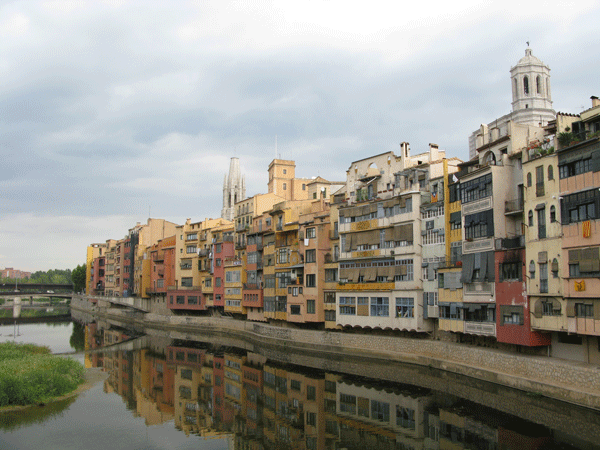by Elyn Aviva
I heard the Call whisper to me as I pressed my hands against its crumbling grey stones. I was standing in the medieval Jewish quarter in Girona, aka “The Call,” a Catalan word based on the Hebrew qahál, which means “a meeting or a gathering.” And gather they did, long ago, the Jewish residents of Girona, Spain, in the winding streets and narrow alleys, in the covered corridors and on the steep-stepped sidewalks. Hurrying to work, to play, to study, hurrying to synagogue to pray. They arrived in 898 and for 500 years they were integrated into the city—except for those dreadful times like 1391 when suddenly they weren’t and they became the targets of violence and repression.
 I had seen their traces in the Museum of Jewish History, housed in what had been the Girona synagogue until 1492 when all the Jews were expelled, ending 500 years of coexistence. Suddenly they were gone, all gone, forced from their temple, their homes, their land, and sometimes from their faith.
I had seen their traces in the Museum of Jewish History, housed in what had been the Girona synagogue until 1492 when all the Jews were expelled, ending 500 years of coexistence. Suddenly they were gone, all gone, forced from their temple, their homes, their land, and sometimes from their faith.
I had seen what little they had left behind, displayed in the museum’s evocative exhibits. One gallery held fourteenth-century limestone gravestones, engraved in Hebrew (“Josef, a young child who was a lover of joy, the son of Rabbi Jacob. May he be present in Glory, protected by his Rock and his Redeemer" and “the honored Estelina, wife of the distinguished and upright Bonastruc Josef. May she have her mansion in the Garden of Eden”). Other galleries were filled with rare artifacts, facsimiles, and borrowed objects, with modern reconstructions and pictorial displays. Nothing else remained of the once-thriving community—except its reputation. Not even time’s amnesia could silence that, for Girona had been the center of a famous medieval school of Kabbalists, those mystical philosophers who believed the universe was made manifest in ten emanations.
The most famous Kabbalist of that time was Rabbi Moses ben Nahman (also known as Ramban or Nahmanides), born in Girona in 1194 and died in the Holy Land in 1270. In 1263 King James I of Aragón (a personal friend) summoned him to Barcelona to defend Jewish beliefs against the Dominican Pablo Christiani, a Jewish convert to Christianity. King James awarded Nahmanides a prize and declared that never before had he heard "an unjust cause so nobly defended."
